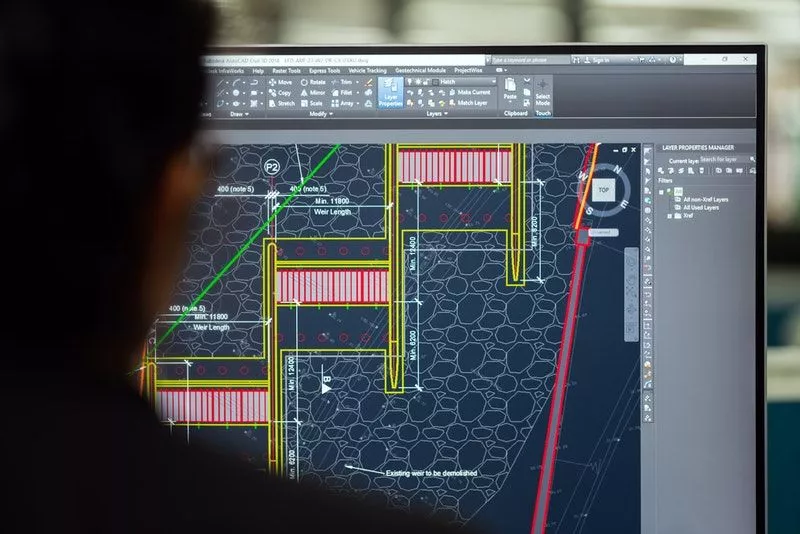Becoming a professional engineer is no easy task. There are many different types of engineering degrees to choose from, and each one comes with its own set of challenges. So, which degree is the hardest to study? Is it civil engineering?
In this article, we will explore what studying civil engineering involves, and find out if it is hard based on the challenges students will face. We will also look briefly at how hard it is compared to other engineering degrees. Finally, we will give some tips on studying it, in order to work as a civil engineer.
Let’s get started!
Table of Contents
1. What does studying civil engineering involve?
2. Is civil engineering hard to study?
3. The challenges of studying civil engineering
4. Is civil engineering hard to study compared to other engineering disciplines
5. Tips for studying a civil engineering degree
What Does Studying Civil Engineering Involve?

Civil engineering is one of the oldest, most versatile, and established engineering disciplines. It involves planning, designing, constructing, and maintaining the physical and environmental infrastructure of our cities and towns. This can include everything from roads to bridges, flood barriers to sewage systems, and schools to hospitals.
Given that the field of civil engineering has such a wide range of applications, it is no surprise that people who are interested in this field of engineering ask if it’s a hard or difficult degree to study.
Typically, civil engineering students may take engineering classes in mathematics, physics, materials science, geology, and environmental science. They also learn how to design and construct buildings and other infrastructure projects, how to choose the right materials, and how to use specialist 2D/3D software packages such as AutoCAD, ArchiCAD, and Civil Designer.
Civil engineering program has also developed to consider a wider range of environmental issues in recent years, allowing us to address pollution and water scarcity problems while also considering the potential of sustainable energy within the sector.
You can learn more about civil engineering in our more in-depth guide: Everything You Need to Know About Civil Engineering
Is civil engineering hard to study?
So, is studying civil engineering hard?
The answer to that question depends on a few factors, including an engineering student’s individual circumstances, the subjects you are strong in, and also what you consider “hard”. Civil engineering is definitely one of the more challenging engineering degrees available, but it’s not necessarily harder than other types of engineering degrees.
Let’s dive into the challenges and expectations that students studying civil engineering will face.
The Challenges of Studying Civil Engineering

One of the most important things to be aware of is coursework is extremely demanding. The civil engineering college major requires a lot of dedication to stay on top of your workload. So to manage all the lectures, lab work, and study time required, you’ll need to be extremely well organized with your time.
Another thing that makes civil engineering difficult is that it covers a wide range of topics as we mentioned earlier, given it’s a very versatile degree so you will learn across a number of different fields. Environmental problems, construction methods, and many more things are all factors that must be understood by civil engineers.
A drawback for some civil engineering students is that it is a practical degree. This means that you will not just be learning from textbooks, but will need to spend time undertaking practical tasks such as site surveying, material testing, and creating designs with computer-aided design software to mention a few.
If you aren’t a fan of mathematics and science (particularly physics or chemistry), lack an aptitude for them, or simply don’t enjoy them, then any engineering field will be a challenge.
With civil engineering in particular you’ll need to learn and use many math concepts such as calculus, differential equations, trigonometry, and algebra. There will be some students who find topics on structural analysis, hydraulics, thermodynamics, materials science, and fluid mechanics difficult, and some students will who will not!
It all depends on the effort you are willing to put in.
It might also be difficult to obtain the grades necessary to fulfill entry requirements for civil engineering studies. Although entry requirements vary between institutions, expect the leading universities and colleges to be selective due to the competition, so will require top entry grades. For example, the UCAS points to study civil engineering range from 96 (CCC at A-Level; MMM-DD at BTEC level) to 200 (A*AAA at A-Level; D*DDD at BTEC level) points in the UK. [1] Or in the USA the minimum freshman entry requirements are an ACT math score of 25 or higher (or an SAT Math score of 590 or higher) and a 3.0 or higher unweighted high school GPA. [2]
Finally, one of the harder tasks that students face is working in teams. Civil engineering is a team-based profession, so learning how to collaborate will be essential. This means being able to work well as part of a bigger group and communicating effectively with your coworkers that participate throughout the design, construction, and management process.
So in the section above, we’ve addressed some of the reasons why civil engineering can be perceived as hard. But, in comparison to other types of engineering degrees, what is it comparable to?
Is civil engineering hard to study compared to other engineering disciplines?
The short answer is yes, and no. In this section, we’ll outline some of the most common opinions on this topic.
A number of people say that civil engineering is harder than studying chemical engineering, as you need to have a stronger foundation in maths and science. Therefore, it can be said that civil engineering is hard when compared to chemical engineering.
Some professionals in the fields of nuclear, mechanical, aerospace, and electrical engineering argue that the maths in civil engineering is easier because it’s not as complex or diverse.
While the above opinions are purely subjective (i.e. based on an individual’s perspective), it is important to remember that everyone has different strengths and weaknesses. So what might be hard for one student, may not be as hard for another.
What we can say definitively, however, is that civil engineering degree programs are extremely comprehensive and diverse. So if you’re looking for a challenge then studying civil engineering will definitely provide this.
Tips on Studying Civil Engineering

1. The civil engineering major requires a lot of math and physics, so it may be difficult for people who don’t enjoy these subjects
2. There are numerous distinct areas of civil engineering that may help you discover what excites you most. The following are some examples of specialties: structural engineering, environmental planning, and water resource management
3. Knowledge of planning and construction laws and regulations will be part of what you will need to be aware of so make sure to stay updated on these.
4. As the field is constantly evolving, it’s important to keep up with technological advances. This may include attending seminars or workshops, as well as reading professional journals.
5. Don’t forget the importance of effective communication! This is a critical skill for civil engineers as much of the work is team-based.
6. Engineering education is very demanding, so make sure to take care of your wellbeing by maintaining a healthy lifestyle. This includes eating well, exercising, and getting enough sleep.
Wrap Up
So, is civil engineering hard? The answer is yes, it can be a challenging degree to obtain. With its combination of practical coursework and theoretical learning, this degree provides students with a strong foundation that can be applied in many engineering fields. So don’t let the challenge put you off – if anything, it should only make you work harder to achieve your goals!
But if you’re up for the challenge, then studying civil engineering degree will take a lot of hard work but it will be an extremely rewarding experience and worth it in the end. Good luck!
References:
[1] https://www.whatuni.com/advice/clearing/entry-requirements-to-study-a-civil-engineering-degree/91948/#Civil%20engineering%20requirements
[2] https://www.uky.edu/academics/undergraduate/engineering/civil-engineering




![Types of Engineers and What they Do [Explained]](https://www.engineeringpassion.com/wp-content/uploads/2022/04/types-of-engineers-and-what-they-do-280x210.jpg)





Leave a Reply